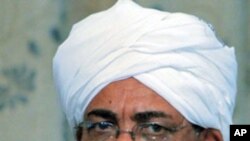A Sudan analyst says he hopes the agreement signed Thursday between the Sudanese government and the Justice and Liberation Movement (JLM) Darfur rebel group will bring final peace and justice to Darfur.
Sudanese President Omar al-Bashir, who is wanted by the International Criminal Court for war crimes in Darfur, attended the signing ceremony in the Qatari capita, Doha.
Professor Ali Ali-Dinar, president of the Darfur Alert Coalition and associate director of the African Studies Center at the University of Pennsylvania said the agreement will test whether President Bashir is committed to lasting peace in Darfur or not.
“Agreement is an agreement, and what people want in Darfur, whether in IDP [internally displaced people] camps or at home, is peace and justice. We have been on this path before and there was no peace and justice, and we hope this time there will be peace and justice,” he said.
Darfur’s main rebel group, the Justice and Equality Movement (JEM) and factions of the Sudan Liberation Army did not sign the agreement.
A spokesman for JEM said the accord does not resolve Darfur's main problems of human rights violations, the distribution of power and wealth and the compensation and return of displaced persons.
Ali-Dinar said the absence of JEM matters little to him as long as Thursday’s agreement brings lasting peace to Darfur.
“For me, the real test is the intention of the government of Sudan. So it doesn’t matter to me at this point whether it [government of Sudan] signs agreement with JLM or whether they sign agreement with JEM or whether it signs with other groups as long as it is committed to peace,” Ali-Dinar said.
Sudanese President Omar al-Bashir is wanted by the International Criminal Court for war crimes in Darfur.
Ali-Dinar said peace or no peace agreement, Presidential Bashir should still answer for his alleged crimes before the ICC.
“Deeply myself I believe that President Bashir and whoever committed crimes in Darfur have to find their day in court. So whatever he’s doing, this is something he should have done from day one. Just now resorting to peace so that he will save himself from going to The Hague and the ICC, I don’t think this is the right path to follow, and I think it sends a bad signal,” Ali-Dinar said.




